Key Takeaways
- Only 1 in 10 borrowers surveyed knew when student loan payments would resume.
- Nearly half of student loan borrowers said resuming student loan payments will extremely or very much affect their financial stability.
- 56% of borrowers saved the extra cash that would otherwise have gone toward their student loan debt instead of continuing to make payments.
- Only 12% of borrowers continued making payments during the pause.
Student Payments on Pause: The Borrower’s Perspective
Student loans can be a major headache for borrowers, but the U.S. government has helped clear their minds for the time being with a payment pause. We’ve surveyed over 1,000 student loan borrowers to get their reactions and opinions on having their debt halted for the time being.
With the extra time they’ll have to put some money together, how prepared are borrowers for payments to start up again? What are they doing with the extra cash that doesn’t need to go toward debt for the time being? How has their quality of life changed since the pause? Read on to find out!
Preparing for Payments
While borrowers should be aware that student payments have been paused, do they know when they’ll start up again? Also, are they prepared to deal with those payments?
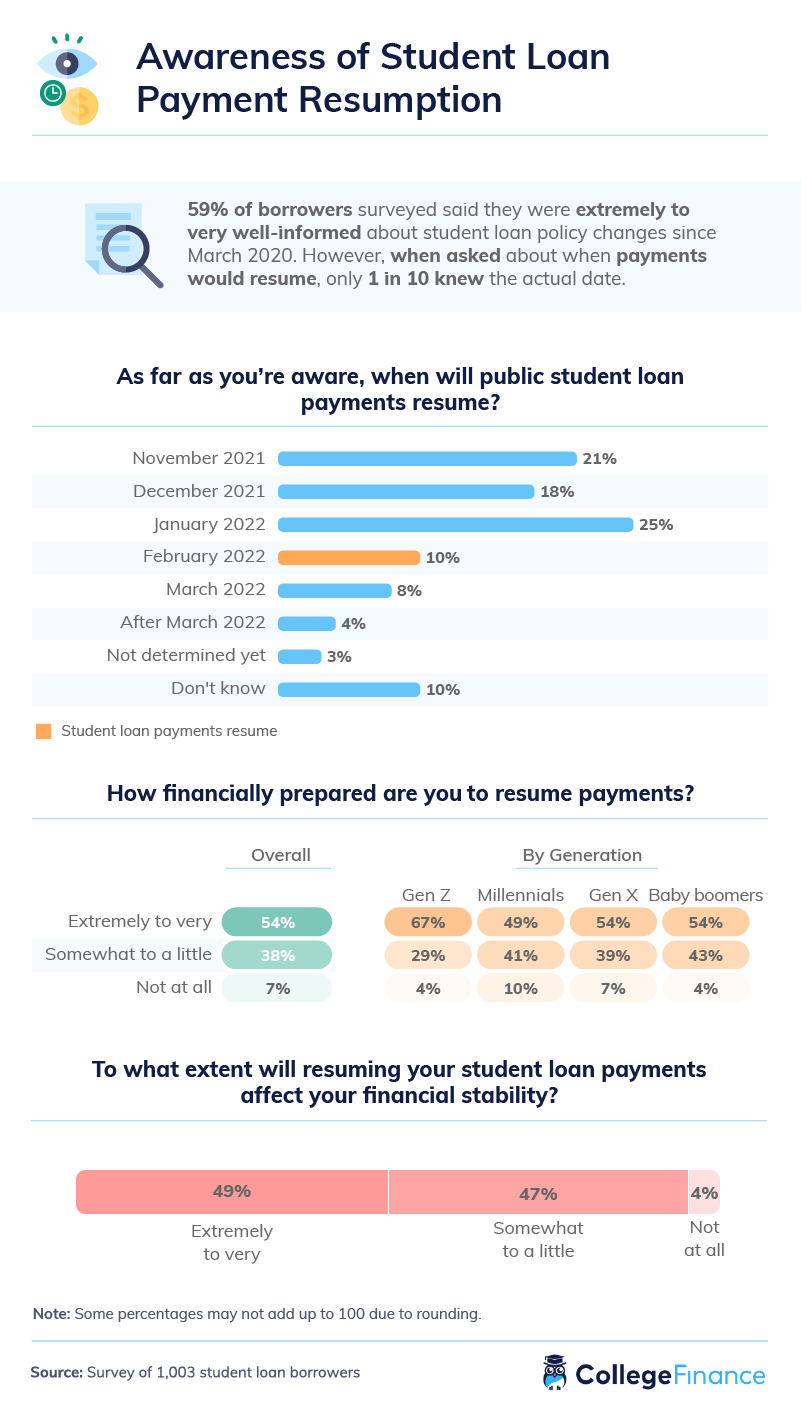
Over half of respondents were in the know about student loan changes in general, but only 10% knew that payments were scheduled to resume in February 2022. A quarter of respondents thought payments were going to start a month earlier. Meanwhile, 39% of borrowers preparing for November and/or December payments at the end of 2021 will likely be happy to find out they have a few more months’ grace. However, another chunk of people who thought payments were due later than February 2022 or that a date was still undetermined might be displeased to learn the truth, while the remaining 10% were completely in the dark about the situation.
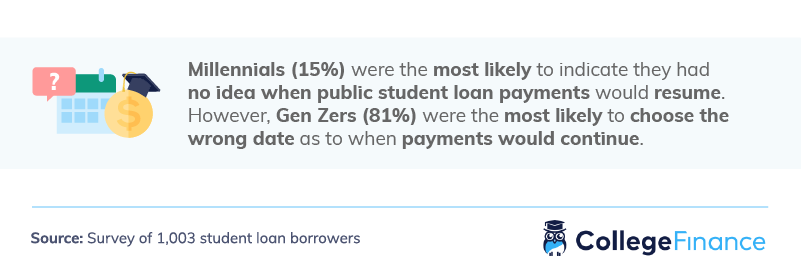
Respondents were also asked if they knew whether the student loan pause began under the Trump or Biden administration. Fifty-nine percent said Trump, which was the right answer. Gen Z was the only generation in which the majority incorrectly thought the pause was instilled under Biden (51%), whereas millennials were the most in the know (65%).
Most students have also done a good job of preparing themselves for eventual payments, as 54% said they were either very or extremely on track for them – Gen Zers were the most ready to tackle them. Year after year, Gen Z sees the biggest increase in their student loan debt compared to other generations, which might explain why they’ve learned to become exceptionally prepared for the payments. That being said, paying back loans would greatly affect 49% of respondents while making a smaller impact on 47% of them. Only 4% of borrowers claimed they’d be unaffected. Although Gen Zers (67%) were the most likely to feel extremely to very financially prepared to resume student loan payments, they were also the most likely to think that resuming payments would extremely to very much affect their financial stability (55%). According to a recent article, student debt has steadily inclined over the last decade, and Americans currently owe an immense $1.37 trillion back to lenders.
Saving Spree
With their payments on hold, borrowers have had some extra cash on hand. However, this didn’t necessarily mean they wanted to blow it …
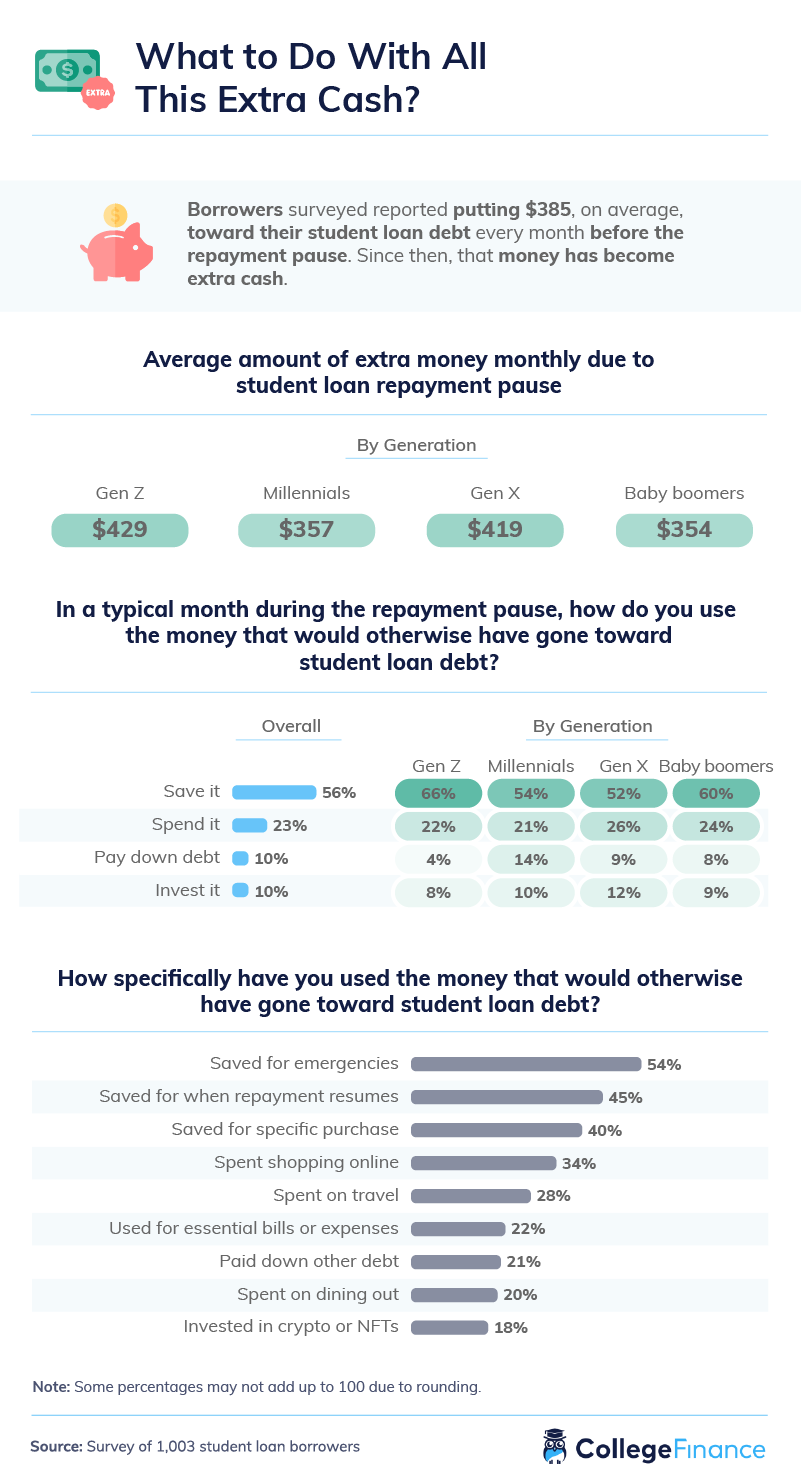
In a given month since the payment pause, 56% of respondents had saved extra money that would have otherwise gone toward paying their student debts. Gen Zers were the most frugal with their money – two-thirds decided to save the cash. Among generations as a whole, though, 22% went ahead and spent it, and the remaining 20% either paid down some debt or invested the money.
Again, most borrowers wanted to be responsible during the pause – 54% of them saved their money in case of an emergency, and 45% were holding on for the eventual payment resumption. We know the herculean sum that is owed in student debt as a whole, and in 2020, a graduate student who had taken out loans owed, on average, $29,927. While some were focused on treating themselves with online shopping, travel, and dining out, many felt it was essential to sacrifice those things to brace themselves for the daunting bills ahead.
Here are a few more interesting data points we’d like to share:
- 12% of borrowers used the money to pay down their student loan debt during the pause. Gen Xers (13%) were more likely to do so than other generations.
- Gen Zers (61%) and baby boomers (57%) were the most likely to have been using that money to build an emergency fund.
- Gen Zers (20%) were more likely to have been using the extra funds to invest in cryptocurrency and NFTs than millennials and Gen Xers (18% apiece).
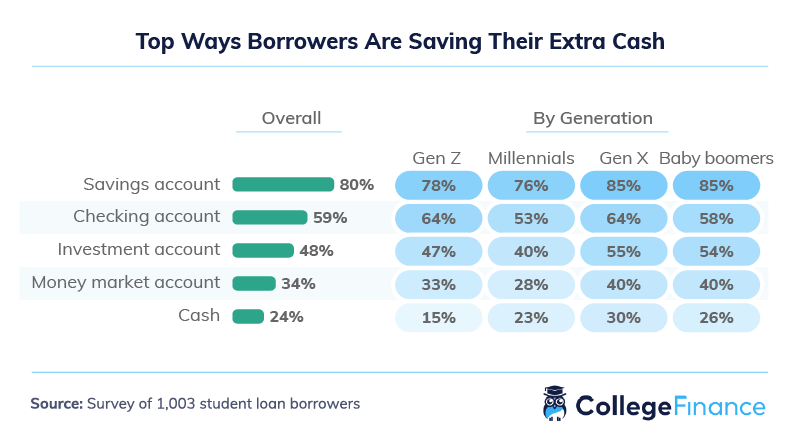
We know borrowers are saving their money, but where exactly are they stashing it? Well, 80% of them had put it in a savings account. This kind of account offers a lot of benefits to its owners – among them are the fact that they collect interest, and the funds inside are easy to pull out, making it a great choice for short-term holdings or to cover emergencies.
Other common accounts to store cash in were checking, investment, and money market ones. Just under a quarter of people preferred to keep their cash on hand.
Plan of Attack
Understandably, many borrowers reported being stressed out about eventually having to repay their student loans. How do they plan on tackling them when the time comes?
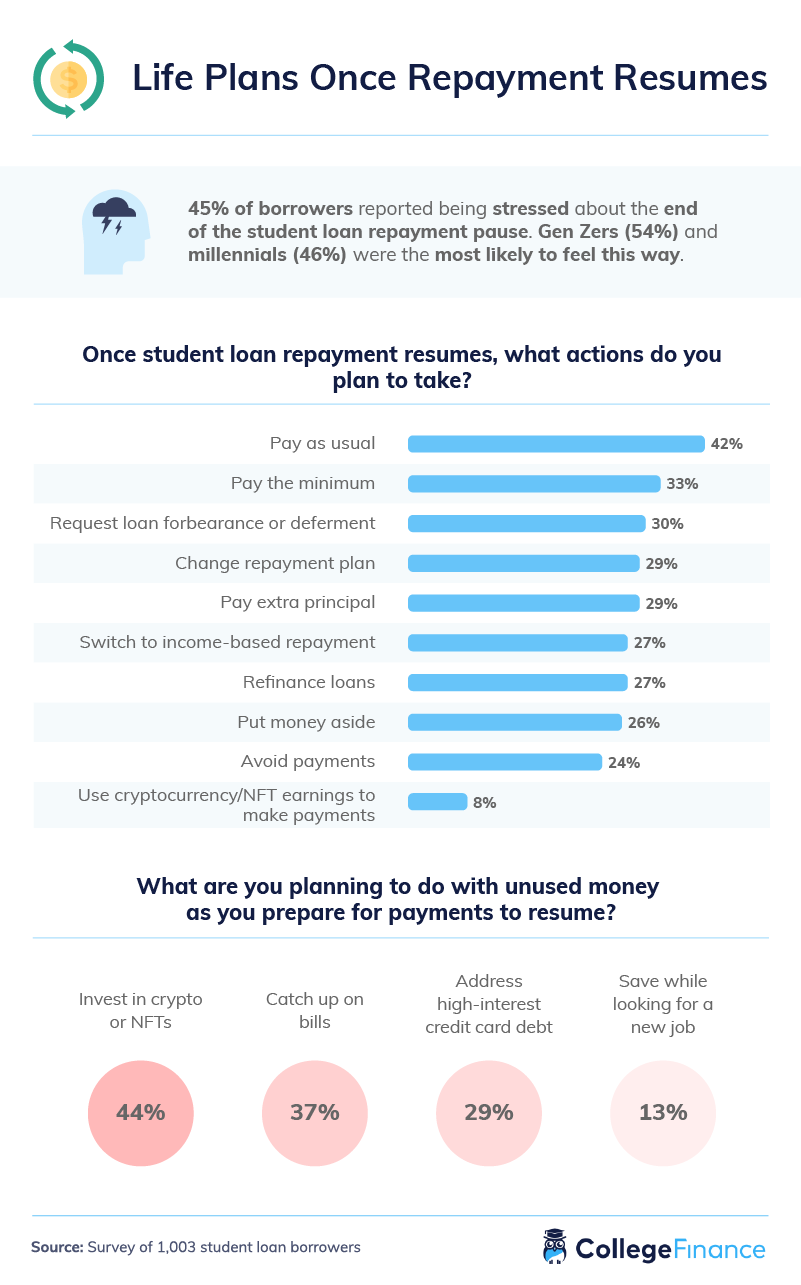
When it’s time to fork payments over, 42% planned to pay them at the usual rate they’d been doing it, but others felt as if that’s just not an option for them. About a third of respondents are going to pay only as much as they need to, and 30% will try to push back their payments altogether. Other options, like refinancing or changing repayment plans, demonstrated the kinds of strategies students considered to make their specific financial situations work.
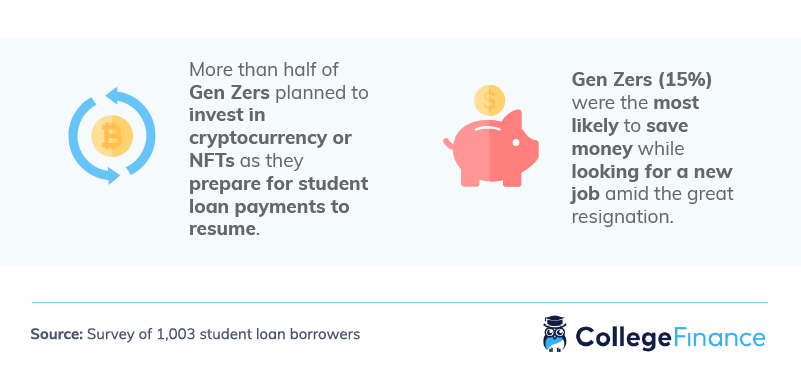
The least likely option was to use cryptocurrency/NFT earnings to pay off student loans, but in preparation for doing so, investing in those two digital currencies was the most common strategy. Unlike a fungible asset (e.g., cash), non-fungible tokens (NFTs) are one-of-a-kind collectibles and have become a hot commodity in the online currency landscape. Buyers of a given NFT own a ‘token’ that proves they own the original work. Some NFTs can sell for millions of dollars – although a student may not be able to afford some of the high-end ones, investing in/reselling more affordable ones is common.
Amid ‘The Great Resignation’, in which approximately 20 million people have quit their jobs in the U.S. since this past April, 13% of respondents had been saving their money while looking for a new line of work. One reason for the mass job exodus was due to the harshness of the pandemic being the tipping point for many to opt out of their low-paying jobs and seek a better situation elsewhere.
Rave Reviews
With the student loan pause, just over half of borrowers said that their life is overall better, and who can blame them?
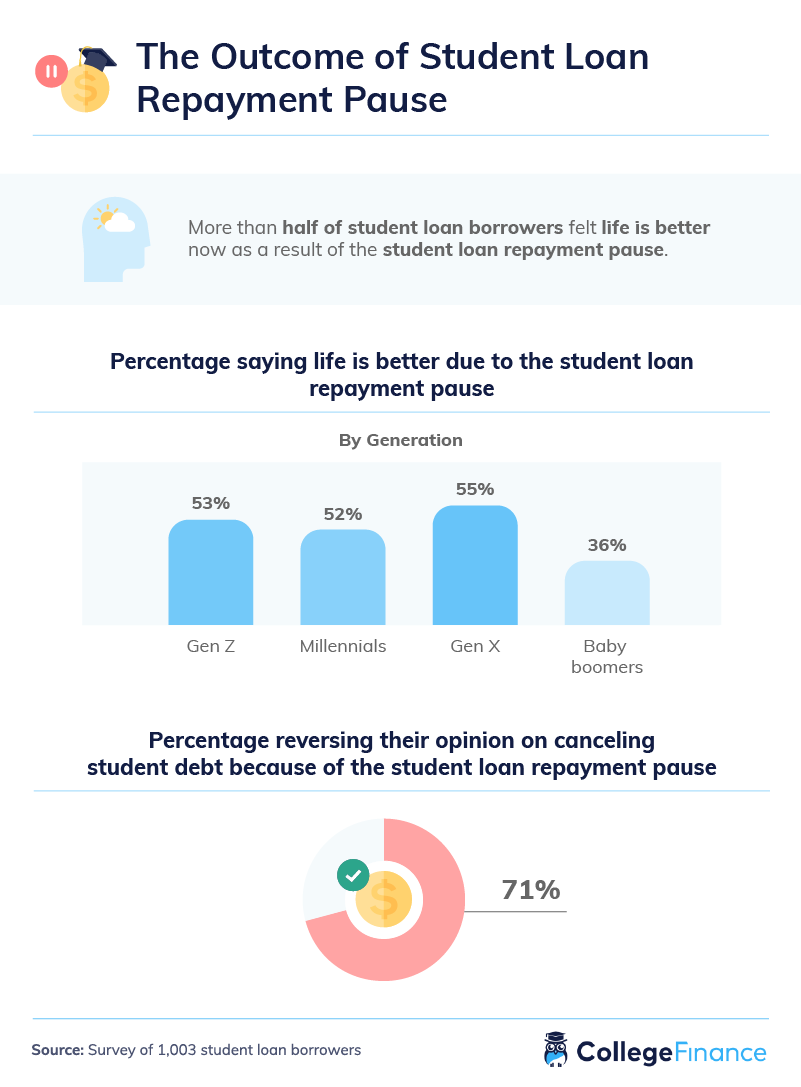
The only people to not be as fazed about student loans were baby boomers, possibly because their debts had been paid off long ago. Either way, 71% of people who previously opposed canceling student loans altogether had changed their stance since the repayment pause has been in place. Now, 69% of respondents support canceling student debt altogether. Also, 65% of student loan borrowers said the temporary 0% rate on student loans worked to their advantage.
Many were looking for the good news to keep rolling in – nearly 1 in 4 student loan borrowers still believe it’s very likely President Biden will cancel all student loan debt, and Gen Zers (33%) were the most likely to think so. Some economists suggest that erasing student debt could stimulate the economy because borrowers could then use that money to buy other things, like a home. On the other hand, other experts think that canceling student loans does nothing to address the actual elephant in the room, being the exorbitant cost of a college education in general.
Back to Reality
With the extra money in students’ pockets due to the loan payment pause, many are actually saving their cash instead of spending it. Given how expensive loans can be, putting aside cash in savings accounts or investing in cryptocurrency or NFTs are a couple ways students can keep their money growing. Therefore, when asked how they felt about resuming payments in January 2022, many felt as if they’d be in a comfortable position to start paying their loans back again.
Naturally, students have enjoyed the pause and are even hoping that the Biden administration eradicates their loan payments permanently, but for now, the return date has already unfortunately been set. Therefore, to learn more about student loans, the best way to prepare yourself when it’s time to repay them, and to make more informed schooling choices in general, head over to CollegeFinance.com now!
Methodology and Limitations
We surveyed 1,003 student loan borrowers. To qualify, their student debt had to be paused during the student loan payment freeze. Among them, 59% were men, 40% were women, and 1% identified as nonbinary.
For generational breakdowns, the sample sizes were as follows:
- Generation Z: 174
- Millennials: 396
- Generation X: 319
- Baby boomers: 114
For short, open-ended questions, outliers were removed. To help ensure that all respondents took our survey seriously, they were required to identify and correctly answer an attention-check question.
These data rely on self-reporting by the respondents and are only exploratory. Issues with self-reported responses include, but aren’t limited to, the following: exaggeration, selective memory, telescoping, attribution, and bias. All values are based on estimation.
Fair Use Statement
If you have outstanding student loans, we hope you can strategize effectively to get them sorted out! Feel free to share this article with anyone you think might find it intriguing but for noncommercial use only. Please also provide them with a link back to this page, so the contributors can earn credit for their work.


